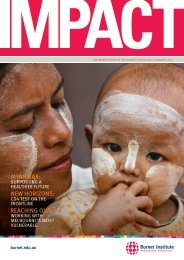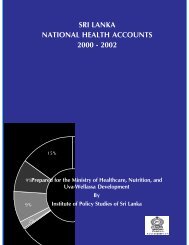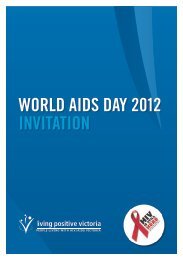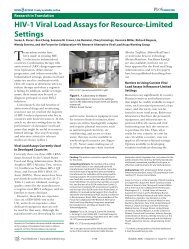Illicit Drug use in the Asia Pacific Region - Burnet Institute
Illicit Drug use in the Asia Pacific Region - Burnet Institute
Illicit Drug use in the Asia Pacific Region - Burnet Institute
Create successful ePaper yourself
Turn your PDF publications into a flip-book with our unique Google optimized e-Paper software.
Situational analysis of illicit drug issues and responses <strong>in</strong> <strong>the</strong> <strong>Asia</strong>–<strong>Pacific</strong> region<br />
324<br />
Issues of drug <strong>use</strong> and HIV/AIDS usually<br />
overlap multiple sectors, <strong>in</strong>clud<strong>in</strong>g health<br />
and law and order . AusAID programs will<br />
<strong>the</strong>refore seek commitment from and to<br />
coord<strong>in</strong>ate efforts with <strong>the</strong> appropriate<br />
m<strong>in</strong>istries and agencies . Advocacy to ga<strong>in</strong><br />
acceptance of <strong>the</strong>se strategies by policy<br />
makers rema<strong>in</strong>s a major priority . In Vietnam,<br />
Australia is build<strong>in</strong>g <strong>in</strong>stitutional capacity<br />
<strong>in</strong> <strong>the</strong> law enforcement and health sectors<br />
to raise <strong>the</strong>ir awareness and capacity <strong>in</strong><br />
relation to effective strategies to prevent<br />
HIV transmission among and from IDUs;<br />
and to build collaborative l<strong>in</strong>kages between<br />
law enforcement and health authorities so<br />
that both sectors work toge<strong>the</strong>r to develop<br />
a supportive policy environment for effective<br />
future <strong>in</strong>terventions .<br />
AusAID programs address<strong>in</strong>g HIV/AIDS associated<br />
with <strong>in</strong>ject<strong>in</strong>g drug <strong>use</strong> will be aligned,<br />
where possible, with wider national drug<br />
control policies and recognise <strong>the</strong> role of<br />
exist<strong>in</strong>g demand and supply reduction and<br />
o<strong>the</strong>r strategies .<br />
Global Fund<br />
Australia cont<strong>in</strong>ues to actively engage with<br />
<strong>the</strong> Global Fund at both <strong>the</strong> headquarters and<br />
country level . Australia works closely with <strong>the</strong><br />
Global Fund Country Coord<strong>in</strong>at<strong>in</strong>g Mechanisms<br />
<strong>in</strong> our region, tak<strong>in</strong>g an active part<br />
<strong>in</strong> help<strong>in</strong>g <strong>the</strong> Global Fund achieve <strong>the</strong> best<br />
possible results <strong>in</strong> <strong>the</strong> <strong>Asia</strong>–<strong>Pacific</strong> region .<br />
Leadership statement<br />
Australia is pleased to note that <strong>the</strong> recent<br />
Leadership Statement on Inject<strong>in</strong>g <strong>Drug</strong> Use,<br />
endorsed by nations at <strong>the</strong> International<br />
AIDS Conference, held <strong>in</strong> Thailand <strong>in</strong> July<br />
2004, recognised that ‘HIV/AIDS epidemics<br />
among <strong>in</strong>ject<strong>in</strong>g drug <strong>use</strong>rs can be prevented,<br />
stabilised and even reversed by timely and<br />
vigorous harm reduction strategies’ .<br />
<strong>Asia</strong> <strong>Pacific</strong> Leadership Forum<br />
The <strong>Asia</strong> <strong>Pacific</strong> Leadership Forum on HIV/AIDS<br />
and Development (APLF) is a strategy aimed<br />
at engag<strong>in</strong>g political and civil society leadership<br />
to reduce <strong>the</strong> spread and impact of <strong>the</strong><br />
HIV/AIDS epidemic <strong>in</strong> <strong>the</strong> <strong>Asia</strong>–<strong>Pacific</strong> region .<br />
The APLF seeks to achieve this goal by <strong>in</strong>creas<strong>in</strong>g<br />
political leadership for effective national<br />
and regional action aga<strong>in</strong>st <strong>the</strong> epidemic . The<br />
APLF provides decision makers and leaders <strong>in</strong><br />
<strong>the</strong> region with opportunities to learn and<br />
apply strategies for extra-ord<strong>in</strong>ary responses<br />
that have high-level political support .<br />
Australia views <strong>the</strong> APLF as an important<br />
mechanism to promote high-level leadership<br />
for effective regional and national action on<br />
HIV/AIDS . Our recent announcement at <strong>the</strong><br />
Second <strong>Asia</strong>–<strong>Pacific</strong> M<strong>in</strong>isterial Meet<strong>in</strong>g of<br />
a new three-year $3 million commitment to<br />
<strong>the</strong> APLF reflects <strong>the</strong> importance Australia<br />
attaches to this strategy .<br />
UNAIDS’ Three Ones Pr<strong>in</strong>ciples<br />
Australia endorsed <strong>the</strong> Three Ones Pr<strong>in</strong>ciples<br />
at a meet<strong>in</strong>g of donors on 24 April 2004 .<br />
The pr<strong>in</strong>ciples aim to speed up action and<br />
make efficient and effective <strong>use</strong> of resources<br />
at <strong>the</strong> country level through streng<strong>the</strong>ned<br />
coord<strong>in</strong>ation and partnerships .<br />
The Three Ones are:<br />
One agreed HIV/AIDS Action Framework that<br />
drives alignment of all partners .<br />
One national AIDS authority, with a broadbased<br />
multisectoral mandate .<br />
One agreed country-level monitor<strong>in</strong>g and<br />
evaluation system .<br />
Major current AusAID-funded programs<br />
<strong>Asia</strong> <strong>Region</strong>al Program<br />
Current activities totall<strong>in</strong>g $11 million focus on<br />
vulnerable mobile populations and on reduc<strong>in</strong>g<br />
HIV transmission through <strong>in</strong>ject<strong>in</strong>g drug <strong>use</strong> .<br />
Fur<strong>the</strong>r activities estimated at $12 million for<br />
support to high-level advocacy, associated<br />
national activities and UN HIV-related task<br />
forces are under consideration . The regional<br />
$2 million drugs <strong>in</strong>itiative will help support<br />
measures to reduce HIV transmission through<br />
drug <strong>use</strong> .<br />
Indonesia<br />
The HIV/AIDS Prevention and Care Program<br />
totals $34 million over five years . It aims to<br />
build capacity to respond to <strong>the</strong> dual epidemics<br />
<strong>in</strong> Indonesia, one through <strong>in</strong>ject<strong>in</strong>g<br />
drug <strong>use</strong> and ano<strong>the</strong>r through heterosexual<br />
transmission .<br />
World Health Organization<br />
Scal<strong>in</strong>g-up HIV/AIDS/STI Prevention among<br />
Inject<strong>in</strong>g <strong>Drug</strong> Users <strong>in</strong> <strong>the</strong> <strong>Asia</strong>n <strong>Region</strong><br />
project, totall<strong>in</strong>g approximately $500,000<br />
per year .<br />
Engagement with UNODC<br />
The <strong>Asia</strong>–<strong>Pacific</strong> region is an area affected<br />
both by <strong>the</strong> production of illicit drugs and,<br />
<strong>in</strong>creas<strong>in</strong>gly, by <strong>the</strong> consumption of illicit<br />
drugs . In particular, Myanmar, Laos and<br />
Cambodia are emerg<strong>in</strong>g as areas of grow<strong>in</strong>g<br />
consumption . With <strong>the</strong> <strong>in</strong>cidence of HIV/<br />
AIDS on <strong>the</strong> rise, and <strong>the</strong> <strong>in</strong>creas<strong>in</strong>g evidence<br />
that HIV/AIDS is l<strong>in</strong>ked to <strong>in</strong>ject<strong>in</strong>g drug <strong>use</strong>,<br />
we need to ensure that attention is be<strong>in</strong>g<br />
foc<strong>use</strong>d on <strong>the</strong>se regions .<br />
The Australian Government has consistently<br />
taken a strong stand aga<strong>in</strong>st <strong>the</strong> ab<strong>use</strong> of<br />
illegal narcotics and recognises <strong>the</strong> importance<br />
of effective <strong>in</strong>ternational cooperation to<br />
combat this global challenge . Australia is<br />
committed to support UNODC as a critical<br />
partner <strong>in</strong> <strong>the</strong> global fight aga<strong>in</strong>st illicit drugs<br />
and would welcome an <strong>in</strong>creased focus by<br />
<strong>the</strong> UNODC on issues concern<strong>in</strong>g illicit drugs<br />
<strong>in</strong> <strong>the</strong> <strong>Asia</strong>–<strong>Pacific</strong> region . In particular, <strong>the</strong><br />
Mekong area is <strong>the</strong> second largest producer<br />
of opium <strong>in</strong> <strong>the</strong> world and many communities<br />
that grow opium are struggl<strong>in</strong>g day to day<br />
to meet <strong>the</strong>ir basic needs .<br />
Australia is also particularly keen for UNODC<br />
to focus discussions on amphetam<strong>in</strong>etype<br />
substances (ATS) — <strong>the</strong>ir production,<br />
consumption and traffick<strong>in</strong>g . ATS is of<br />
particular concern for <strong>the</strong> <strong>Asia</strong>–<strong>Pacific</strong> region:<br />
The 2004 International Narcotics Control<br />
Board report notes that while <strong>the</strong> Greater<br />
Mekong <strong>Region</strong> has had substantial success<br />
<strong>in</strong> reduc<strong>in</strong>g opium and hero<strong>in</strong> production,<br />
it is now becom<strong>in</strong>g a major producer of<br />
ATS and that <strong>the</strong>re has been a rapid growth<br />
<strong>in</strong> illicit drug consumption <strong>in</strong> <strong>the</strong> region .<br />
The consumption of ATS, specifically ATS<br />
and <strong>in</strong>ject<strong>in</strong>g drug <strong>use</strong>rs, is also a concern<br />
<strong>in</strong> <strong>the</strong> region with regard to <strong>the</strong> spread of<br />
HIV/AIDS .<br />
To ensure that <strong>the</strong> <strong>in</strong>ternational community is<br />
able to provide <strong>the</strong> best advice <strong>in</strong> <strong>the</strong>ir policies<br />
and programs, Australia strongly encourages<br />
UNODC to better evaluate each of its activities<br />
and draw on lessons learned .<br />
325<br />
Appendix B: <strong>Region</strong>al aid projects, <strong>in</strong> full









